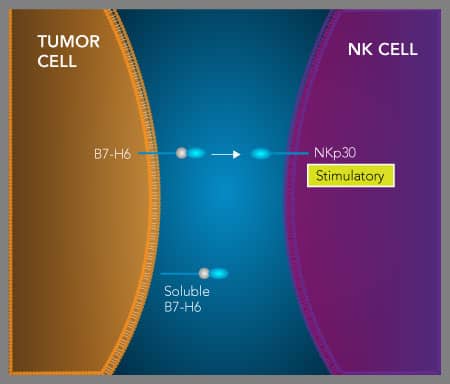B7-H6 Promotes Natural Killer Cell Cytotoxicity
B7-H6, NKp30, and Natural Killer Cells
Unlike other B7 family proteins, B7-H6 is not expressed in normal human tissues under steady-state conditions, but it can be induced under inflammatory stress.1 Accordingly, B7-H6 has been shown to be expressed on a variety of different tumor tissues.1 B7-H6 binds to the NKp30 activating receptor on natural killer cells and induces cytotoxicity, thereby promoting anti-tumor immune responses.1-2 Conversely, it has also been shown that soluble B7-H6, which can be generated by ADAM-mediated ectodomain shedding, is associated with reduced expression of NKp30 and natural killer cell dysfunction in some forms of cancer.3 Additionally, B7-H6 was found to promote tumor cell proliferation and inhibit apoptosis in studies utilizing either human breast cancer or glioma cell lines, further suggesting that B7-H6 may be involved in driving tumorigenesis.4, 5 Similarly, high level expression of B7-H6 in human ovarian cancer was positively correlated with tumor progression and metastasis.6 Together, these observations suggest that B7-H6 may represent a promising therapeutic target.
B7-H6 Induces Natural Killer Cell Cytotoxicity by Binding to the NKp30 Activating Receptor

B7-H6 binds to the NKp30 activating receptor on natural killer cells. Expression of B7-H6 is induced under inflammatory conditions and B7-H6 overexpression is frequently observed in tumors. Although B7-H6 binds to NKp30, an activating receptor expressed on natural killer cells, high level expression of B7-H6 in tumor tissues is commonly associated with tumor progression. Similarly, soluble B7- H6 has been demonstrated to down-regulate NKp30 expression on natural killer cells and inhibit natural killer cell activity, suggesting that B7-H6 may negatively regulate the immune response under certain conditions.
Analysis of the Binding of R&D Systems Recombinant Human B7-H6 and NKp30 Proteins

NKp30 Binds to B7-H6. Recombinant Human B7-H6 (R&D Systems, Catalog # 9309-B7) was immobilized at 1 μg/mL, 100 μL/well and the indicated concentrations of Recombinant Human NKp30/NCR3 Fc Chimera (R&D Systems, Catalog # 1849-NK) were added. Recombinant Human NKp30 bound with an ED50 of 0.02-0.1 μg/mL.
Assessment of the Bioactivity of R&D Systems Recombinant Human B7-H6 Protein

B7-H6 Induces IFN-gamma Secretion by NK-92 Cells. NK-92 human natural killer lymphoma cells were treated with the indicated concentrations of Recombinant Human B7-H6 Fc Chimera (R&D Systems, Catalog # 7144-B7). IFN-gamma secretion was measured using the Human IFN-gamma QuantikineTM ELISA Kit (R&D Systems, Catalog # DIF50). The ED50 for this effect is typically 0.6-3 μg/mL.
-
Kaifu, T. et al. (2011) B7-H6/NKp30 interaction: a mechanism of alerting NK cells against tumors. Cell Mol. Life Sci. 68:3531. PMID: 21877119.
-
Kellner, C. et al. (2012) Mimicking an induced self phenotype by coating lymphomas with the NKp30 ligand B7-H6 promotes NK cell cytotoxicity. J. Immunol. 189:5037. PMID: 23066150.
-
Schlecker, E. et al. (2014) Metalloprotease-mediated tumor cell shedding of B7-H6, the ligand of the natural killer cell-activating receptor NKp30. Cancer Res. 74:3429. PMID: 24780758.
-
Jiang, T. et al. (2017) High expression of B7-H6 in human glioma tissues promotes tumor progression. Oncotarget 8:37435. PMID: 28415577.
-
Zhang, B. et al. (2018) Knockdown of B7H6 inhibits tumor progression in triple-negative breast cancer. Oncol. Lett. 16:91. PMID: 29963127.
-
Zhou, Y. et al. (2015) B7-H6 expression correlates with cancer progression and patient's survival in human ovarian cancer. Int. J. Clin. Exp. Pathol. 8:9428. PMID: 26464699.